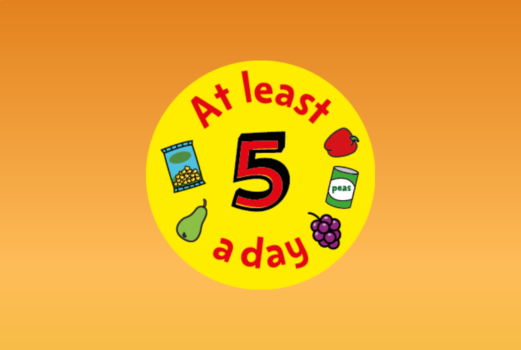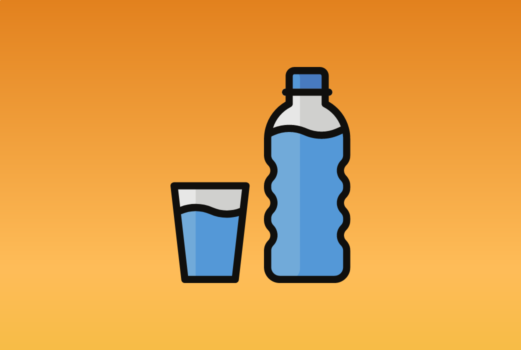Food and Nutrition
Our body needs fuelling in order to perform at its best, so a healthy balanced diet is key to living well. A balanced diet does not mean restricting your diet or cutting out any food groups, it means enjoying whatever food you like, in moderation.
Often food and drink go hand in hand. Many of us like an alcoholic drink at the weekend or when celebrating with loved ones, but it’s easy to slip into a routine where you are consuming too much alcohol. Remember again that alcohol is fine in moderation, but too much can seriously harm your body.

5-a-Day Challenge
We are setting everyone the challenge to make a big effort this week to eat 5 pieces of fruit and veg every day. These could mean swapping your morning biscuit with a banana. If you see the symbol above, it counts as one of your five a day. What’s the prize if you complete this challenge…? A body full of vitamins, minerals and lots of energy.

Stay Hydrated
One of the simplest things our bodies need is often the one lots of us neglect. Water is vital to keep our body and mind working well. The NHS recommend 6 to 8 glasses of water a day. If you find water boring on its own, try adding some sugarfree squash, or cut up fruit like lemon or cucumber to add to your drink.

Healthy Swaps
Small healthy swaps can make a big difference to your diet and your overall health.
For some simple, healthy swap ideas, click the link below.
Let’s remove the stigma attached to mental wellbeing
One-in-four adults and one-in-ten children experience mental illness during their lifetime, and many more of us know and care for people who do.
Improved mental health and wellbeing is associated with a range of better outcomes for people of all ages and backgrounds.
These include:
Improved physical health and life expectancy
Better educational achievement
Increased skills
Reduced health risk behaviours such as smoking and alcohol misuse
Reduced risk of mental health problems and suicide
Improved employment rates and productivity
Reduced anti-social behaviour and criminality
Higher levels of social interaction and participation
Since 2013, NHS England has been working to improve the outcomes and experiences of people of all ages with mental health problems, to ensure that mental health is treated on par with physical health. To achieve this, they work closely with service users, carers, other national NHS bodies and key partners such as social care and the voluntary sector.
Want to see something different?
We are always looking for feedback! If you think we are missing the chance to shout about something great that is going on, let us know!
Send us your feedback